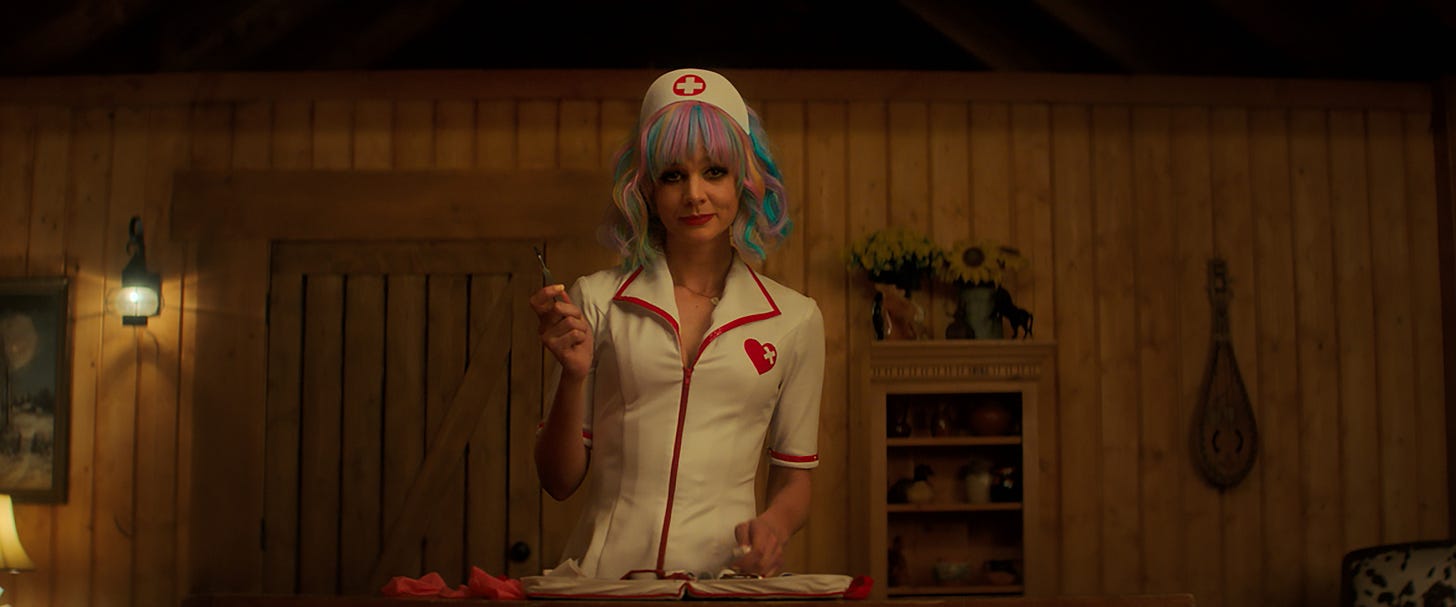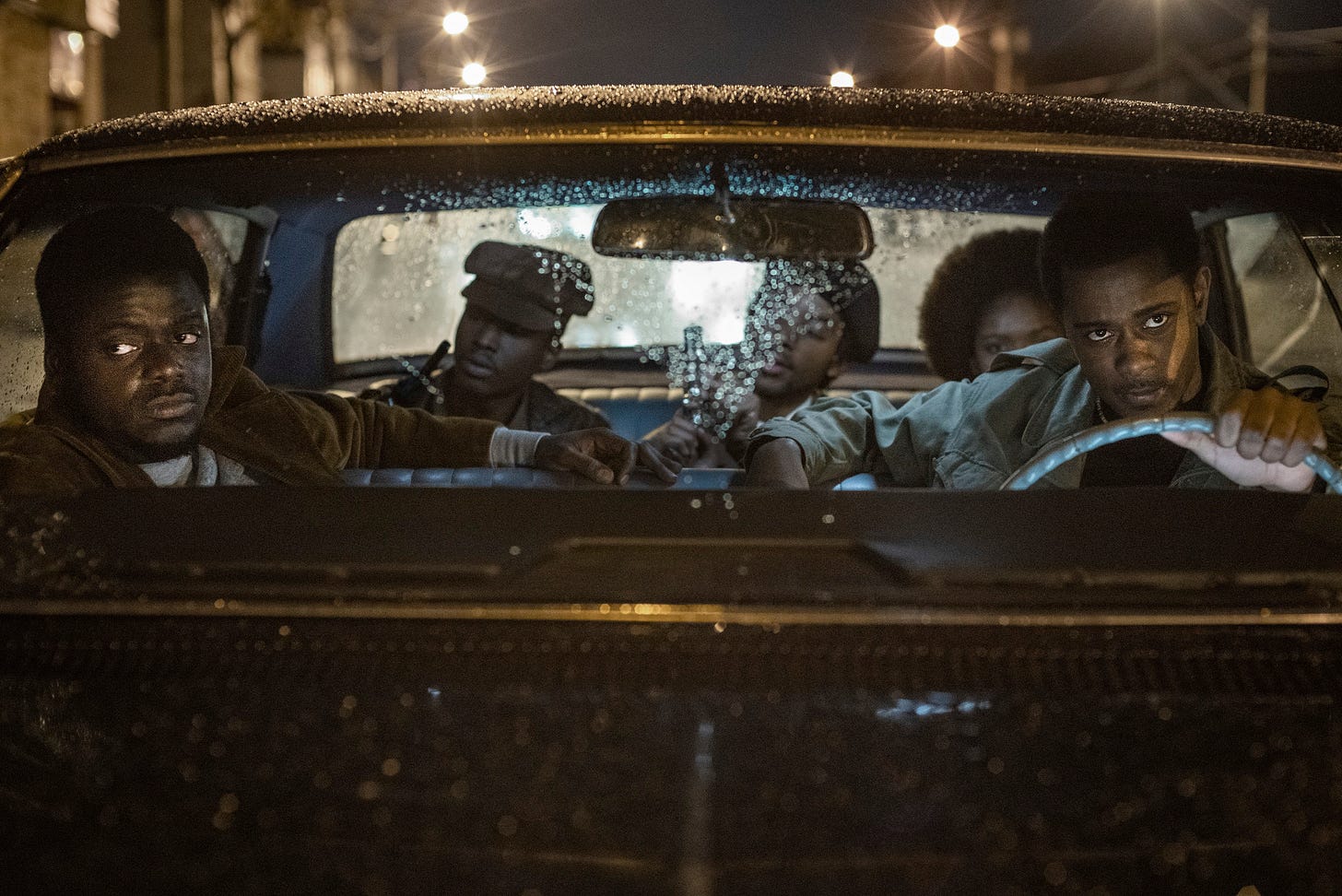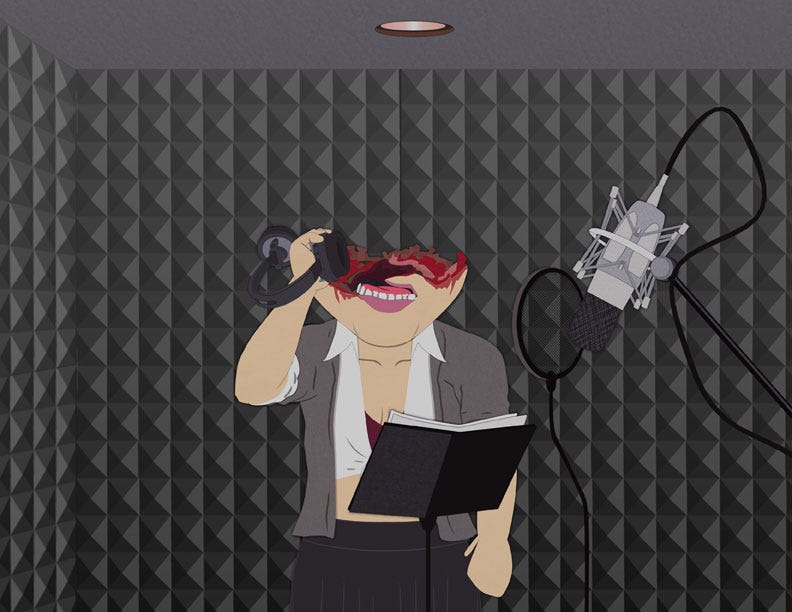Actually, It’s About Ethics in Film Criticism
Plus, 'Judas and the Black Messiah' reviewed
This is going to be a bit inside baseball, so if you skip down to this week’s review of Judas and the Black Messiah, I won’t hold it against you. But it’s worth highlighting, briefly, what happened to freelance Variety critic Dennis Harvey* and why it was wrong.
The long and the short of it is that Harvey, near the close of a positive review of Promising Young Woman after the film showed at Sundance in January 2020, wrote that star Carey Mulligan is “a bit of an odd choice.” He suggested that Margot Robbie, who was a producer for the movie, would have been better cast in the role, and wrote that Mulligan’s character “wears her pickup-bait gear like bad drag; even her long blonde hair seems a put-on.” Still, this is how Harvey closed the paragraph: “like everything here, this turn is skillful, entertaining and challenging.” In short: Mulligan, best known for prestige pictures, was an odd choice in this movie, yet she pulled it off.
Fair enough. Margot Robbie herself said something similar in December, as Richard Rushfield noted! No one thought to complain about Harvey’s review for 11 months. And then, as the film was released and as Mulligan began making the rounds on the interview circuit — and the awards-season circuit — Mulligan spoke out, saying that she was distressed Variety’s critic would say she “wasn’t hot enough” for this Very Important Role in a movie about sexual assault.
It is worth emphasizing: this is not what Harvey said. He said she was an unusual casting choice. He critiqued the costuming choices. But even if he had said she didn’t have the right look for this particular role: So what? Film critics are absolutely allowed to note that certain casting choices work or do not work, and an actor’s look — not necessarily their looks but their look, their vibe, their mood, the history they bring to a picture — is an important part of any actor’s arsenal. As my friend and colleague Alyssa Rosenberg noted, appearance on film matters and is fair game for critique. Casting is important and can change how a film is perceived; Angelica Jade Bastién makes exactly this point in her review of Judas and the Black Messiah, noting that the two leads, Daniel Kaluuya and LaKeith Stanfield, are a decade older than the real-life figures they’re portraying, an age gap that radically alters how we perceive the tragedy of this Fred Hampton (Kaluuya) biopic.
No matter: Variety appended an utterly spineless apology to the beginning of Harvey’s review of Promising Young Woman:
EDITOR’S NOTE: Variety sincerely apologizes to Carey Mulligan and regrets the insensitive language and insinuation in our review of “Promising Young Woman” that minimized her daring performance.
This is, again, craven: What we have here is a publication that relies on advertising revenue generated by “For Your Consideration” Oscar campaigns throwing one of its critics under the bus at the behest of an actress in a movie that will be spending six figures on one such campaign. At best it’s a cowardly move; at worst, it’s nakedly corrupt. Simply put: This is an ethical disaster, one that makes a fool of anyone who considers Variety’s reportage or criticism aboveboard. How can we trust that they aren’t scrubbing anything that might offend an Oscar-campaigning star?
The truly shocking part of all this is that the vast majority of critics couldn’t be bothered to say anything about it for weeks. With the exception of Robbie Collin and Kyle Smith (and a trio of critics at a small podcast called Across the Movie Aisle), no one had much to say about it. A handful of tweets here and there. But, for the most part: silence. This from a collective that spent a whole week complaining about Malcolm & Marie’s insinuation that many critics are not particularly good at their job, being more concerned about narratives than honestly appraising art.
I can’t think of a better way to prove Sam Levinson, Malcolm & Marie’s writer/director, right. Here was naked corruption resulting in a grotesque violation of one of their peers, and it was met with silence. Silence that derived from fear: fear of losing potential work with Variety; fear of angering Twitter’s ugly, fanatical mobs; fear of losing access to an actress or a filmmaker or a studio.
Fear.
I guess it’s good that the National Society of Film Critics finally released a statement defending Harvey this week. Bravo. But, as another critic whose own fear has caused him to stay silent on this issue pointed out to me in my DMs, it is notably absent of signatures. The fact that so few critics are willing to stand up, on principle, and say that this is a travesty is a stinging indictment of the profession as a whole. Shame on everyone who remains silent.
*Correction: The critic in question is Dennis Harvey, not James Harvey, as this newsletter originally had it. James Harvey is the recently departed writer whose great book Watching Them Be: Star Presence on the Screen from Garbo to Balthazar is, possibly, instructive in this whole matter.
The reliance on advertising and the need to curry favor with the rich and powerful is one reason why traditional journalism is in such a bad spot. One way you can support writing and reporting without fear or favor is by signing up for Bulwark+: I promise you, you’ll never read anything in this newsletter except for what I honestly believe. And you’ll never hear anything on Across the Movie Aisle or The Bulwark Goes to Hollywood that isn’t honest analysis bereft of anxiety at the thought of alienating an advertiser.
Judas and the Black Messiah (HBO Max/Theaters)
Judas and the Black Messiah wants to be a tragedy. Unfortunately, this portrait of murdered Black Panther Fred Hampton (Daniel Kaluuya) and the snitch who got him killed, Bill O’Neal (LaKeith Stanfield), is not abundantly clear on who the tragic figure is meant to be.
The title is a clue of sorts. Hampton is the titular Black Messiah, whose arrival menacing, racist ghoul Jay Edgar Hoover (Martin Sheen) says must be thwarted by any means necessary in the opening moments. Hampton’s big, he’s strong, he’s charismatic, he’s poetic. He can bring together not just rival black factions in the city of Chicago but rivals across race, within socioeconomic categories. His rainbow coalition unites poor whites and blacks in the hopes of effecting change that will last. Like Christ, he’s feeding the children and urging the brotherhood of men; unlike Christ, he’s doing so while armed to the teeth.
O’Neal is this Christ figure’s Judas, a car thief and small-time hood who finds himself among the Panthers when FBI agent Roy Mitchell (Jesse Plemons) turns him into an informant. As O’Neal insinuates himself deeper into the Panthers’ world, he seems to become more in tune with their cause, as when he leads the rebuilding of the chapter’s headquarters following its firebombing by the Chicago PD. Except sometimes he isn’t, as when he tries to entrap Hampton into saying he wants to blow up City Hall on tape. Except sometimes he is again, as when he looks very sad at the funeral of a man killed by the cops.
We are meant to feel sadness at the shooting of Hampton near the film’s end, and fair enough. But the tragic figure in the story of Judas and Christ isn’t Christ, it’s Judas, the man who sells his soul for 30 pieces of silver. Hampton is a martyr, but there’s nothing tragic about him: He died upholding his principles, fighting for what he believed in. O’Neal should be the tragic figure, and you catch the briefest glimpse of that fact right at the end of the picture, in a title card noting that, two decades later, after the initial airing of Eyes on the Prize II, in which he was interviewed, he killed himself.
But if O’Neal betrayed a man—and more importantly, a cause—he really and truly loved for filthy lucre, Judas and the Black Messiah is reluctant to show it. His ambivalence about the Panthers, his fear of being caught and tortured to death, and his love of money for ratting them out unbalances the picture, skews his motivation. Splitting the film almost evenly between Hampton and O’Neal takes the focus off of the tragic figure at the story’s heart; we’re left uncertain of his motivation, his commitment, his true hopes and desires.
There is still power in this movie. I like LaKeith Stanfield’s twitchiness as O’Neal, and Kaluuya is an imposing, physical presence: He’s clearly bulked up for the role, and speaks in a sort of machine-gun staccato when delivering addresses. As a piece of historical filmmaking, the angrier and more forceful Judas and the Black Messiah makes an interesting contrast with the neutered mediocrity of Aaron Sorkin’s Trial of the Chicago 7. I just wish director and cowriter Shaka King’s focus had been a bit more pointed, and his critique of the structural forces opposing Hampton’s work a little less ham-handed.
--
Assigned Viewing: South Park’s “Britney’s New Look” (HBO Max)
In the new documentary about Britney Spears on Hulu, we are led to believe that no one had any idea that what was being done to Britney Spears—her harassment by the media; her treatment as an object of ridicule by society—was monstrously wrong. Allow me to correct this narrative by highlighting the second episode of the 12th season of South Park, “Britney’s New Look.”
This episode debuted in 2008 and it’s a wonderful reminder that anyone with a brain could look at what was being done to Britney Spears in full view of all of us and find it horrifying.





